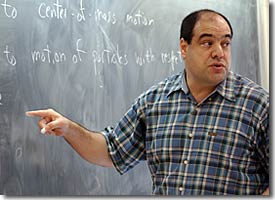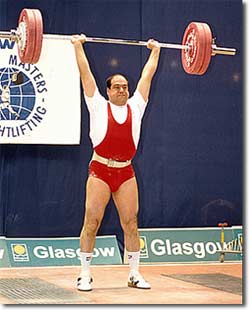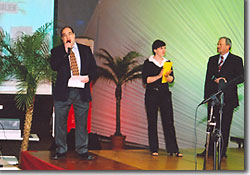|
Like many physics professors, David Meltzer thought he was a good
teacher. He was dedicated to helping students, and he believed he gave
very good lectures. Yet he couldn’t help but notice that despite his
efforts, his students just weren’t learning what he wanted them to
learn .

David Meltzer at the blackboard.
|
Rather than just continuing to lecture in the same old way, Meltzer
sought to find out why his students had so much trouble. “I began to
read studies, and I found my experience was common and there were
reasons for it, and there were ways one could address the problem,” he
says. So Meltzer familiarized himself with the latest research in
physics education, and he developed a new way of teaching.
Now, in professor Meltzer’s physics classes at Iowa State University ,
students don’t just sit back and listen, they are actively engaged in
thinking, answering questions, and discussing tough concepts with their
fellow students.
Instead of a
traditional lecture where the professor talks for an hour and then asks
if there are any questions, Meltzer often gives a short overview or
introduction to a topic, then poses a series of multiple choice
questions, which students answer by holding up a flashcard with a
letter. The students usually have a few minutes to think over their
answers and discuss with fellow students before holding up their
flashcards. If the class is split, Meltzer will encourage a debate, and
then try to guide the students to the correct answer. This technique,
which Meltzer uses even in large lecture classes, not only keeps the
students actively engaged, it lets the lecturer know whether the
students are grasping the concepts he’s trying to explain.

Completing a clean and jerk of 135 kg (298 lbs) at the 1999 World
Masters Weightlifting Championships in Glasgow, Scotland
|
Meltzer
began his career in condensed matter physics, and then directed his
research into physics education. But he says he has long been
interested in teaching and learning. Like many physics students, he was
often unsatisfied with the instruction he received. “I was a frustrated
student,” he says, “I felt it could be done better and clearer. After
you learn the material, you feel you could teach it better. I later
learned that it’s not so easy,” he says.
After
receiving his bachelor’s degree in physics from Columbia University in
1974, Meltzer completed a PhD in condensed matter theory at SUNY Stony
Brook in 1985. For several years he conducted research in condensed
matter physics at Oak Ridge National Laboratory and the University of
Tennessee, and then at University of Florida. In 1991, he took a
position at Southeastern Louisiana University in Hammond, Louisiana,
where his interests began to shift towards teaching. So after finishing
up some work on condensed matter theory, Meltzer decided to focus his
research on physics education.
In
1998 he moved to Iowa State University, and set up a physics education
research group there. In addition to developing the flashcard system,
Meltzer investigates student understanding of a variety of physics
topics. For instance, Meltzer and his colleagues recently studied some
of the difficulties students have with thermodynamics, and now he’s
working on developing materials to help students better understand
these concepts.
Aside from his
physics and physics education research, Meltzer has studied the
physiology of weight lifting, which also happens to be a hobby of his.
In one study, he investigated the question of how an athlete’s body
weight affects the rate of decline in performance with age. “Do heavier
guys go down quicker? As best as I can tell, my answer was no, the rate
of decline was the same, whether you were light or heavy,” says
Meltzer. This research led to publication in a prestigious sports
science journal. “It’s actually some of my most widely cited work,”
laughs Meltzer.
It’s also been
relevant to him, as he trains for and competes in international masters
Olympic-style weight lifting competitions. He has won medals in several
recent World Masters Championships.

Singing a medley of 43 different national anthems (first couple of
lines only) during the opening ceremony of the 2004 World Masters
Weightlifting Championships, Baden , Austria , September 25, 2004 . The
flag bearers of the teams are marching into the hall, and are visible
on the projection screen in the background.
|
In
addition to competing, Meltzer sings the national anthems at these
events. Meltzer can sing an amazing number of different national
anthems, in the original language. He got started on this unusual hobby
by watching the Olympics as a child. He liked the sports, but he also
really enjoyed the anthems, he says. “I really liked the melodies. They
just seemed to be attractive to me. I liked the sounds and I liked to
sing,” he says.
Meltzer started
learning to sing a few anthems, and he found that for some reason, it
was something he could do well, and he liked doing it. Even better,
people liked to hear him sing. So he decided to learn more and more of
them. Soon the challenge became learning how to pronounce the words,
says Meltzer. “How do you pronounce Mongolian? You can fake it, but it
doesn’t sound good.”
Fortunately, the
physics and academic community has enabled Meltzer to make connections
with people from all over the world who have helped him learn to
pronounce words in some of the most difficult and obscure languages. He
now sings over 130 different anthems, and plans to learn more.
Download complete article in PDF format
|



